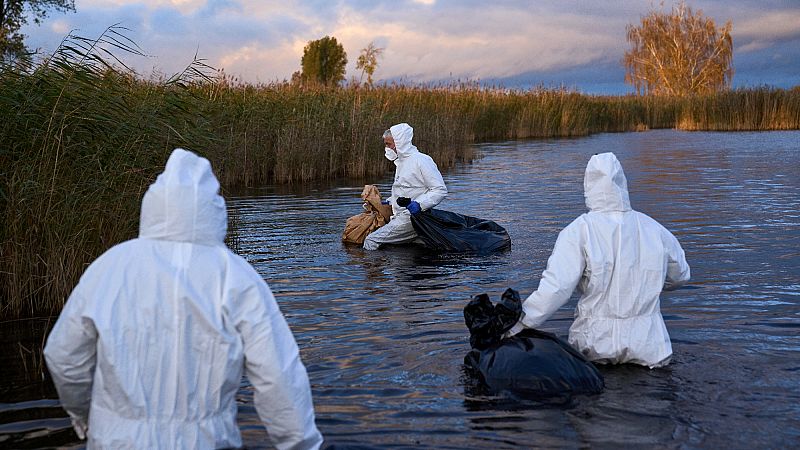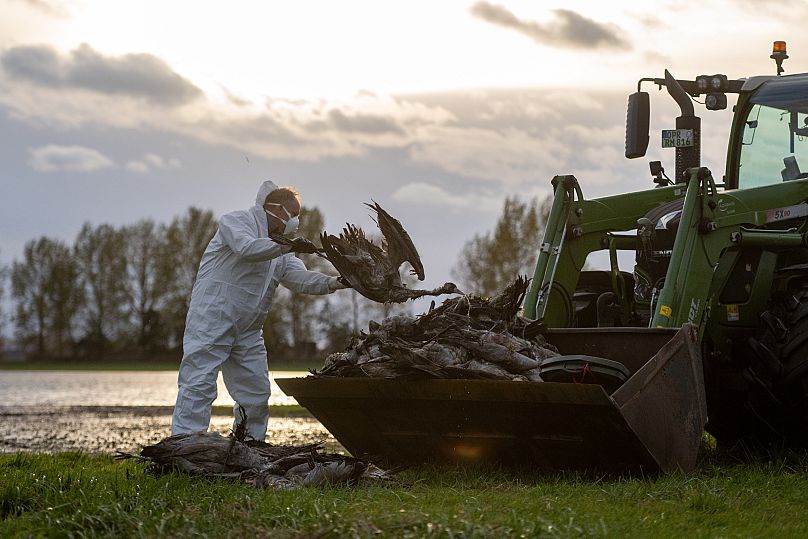Bird flu virus has 'everything it takes to trigger a pandemic,' warns WHO virologist

An increasing number of poultry farms in Germany are being affected by bird flu. Since the beginning of September, the Friedrich Loeffler Institute has recorded around 31 outbreaks of the virus in livestock farming and 131 cases of avian influenza in wild birds.
This autumn, the Friedrich Loeffler Institute reported that this is happening unusually early and rapidly. More than 500,000 chickens, ducks, geese and turkeys have already had to be killed. A particularly high number of cases have been recorded in eastern Germany and Lower Saxony.
According to the institute, avian influenza is a highly contagious and rapidly fatal infectious disease in many bird and poultry species. In the near future, a large-scale spread due to migratory activity must be expected, the institute said in a press release. It categorised the risk as "high".
How dangerous is bird flu?
"In principle, the H5N1 virus has everything it takes to trigger a pandemic," virologist Klaus Stöhr told the German news agency dpa. Stöhr, the long-standing head of the World Health Organization's influenza programme, warns of another pandemic.
He emphasised that the risk of infection for humans has so far been extremely low. "Anyone who comes across dead animals, for example, when out walking, should not touch them, keep their distance, keep their dog back and inform the relevant veterinary office," Stöhr advised.
Dead animals should not be moved and should only be collected by the veterinary office. This autumn, cranes are particularly affected.
There are now cases worldwide in which wild poultry are spreading the virus.
"This means there are now infinitely more opportunities for transmission and adaptation to humans. This risk should not be underestimated," said Stöhr.
At the same time, good precautions can be taken to prevent such an outbreak. "There have always been pandemics, and good pandemic planning is the best preparation," he said. Precautions can be taken by monitoring livestock, developing new vaccines and global pandemic plans.
Possible supply bottlenecks for eggs and poultry?
According to the Friedrich-Loeffler-Institut, the peak of the bird migration is still to come. Poultry farms are therefore still called upon to strictly adhere to hygiene measures. To contain the disease, protection zones with additional requirements are in place in many regions.
"We are already in an early but strong phase of the outbreak - laying hen and turkey flocks in open and free-range systems are particularly affected," explained Hans-Peter Goldnick, president of the Central Association of the German Poultry Industry (ZDG).
Goldnick warns that politicians must now intervene to contain the further spread. Supply bottlenecks for eggs and poultry meat cannot be ruled out. "We are calling on the federal states to take action now. Waiting is not an option," said Goldnick.
The Federal Ministry of Agriculture is responding. Minister Alois Rainer (CSU) is calling for close cooperation between the federal and state governments to protect livestock. He also wants to apply to the EU for an increase in the compensation ceiling from €50 to €110.
Stiko: Avoid double infection with flu and bird flu
In addition, the Standing Committee on Vaccination (Stiko) and the pharmacists' associations advise people at risk to be vaccinated against influenza. Anyone who works with certain animals or has private contact with them should avoid a double infection with seasonal flu and bird flu.
Due to the risk of bird flu, the Stiko had already extended its vaccination recommendation at the beginning of the year, Thomas Preis, president of the Federal Association of German Pharmacists' Associations, told theRheinische Post.
"Everyone who has professional and private contact with poultry, wild birds, pigs and seals should be vaccinated against influenza to avoid contracting influenza and bird flu at the same time," he continued.
In the 2024/2025 vaccination season, around 122,000 people were vaccinated against influenza and around 80,000 people against the coronavirus in pharmacies - significantly more than ever before, according to a report by the pharmacists' associations.
"The aim is to prevent the emergence of a new variant of bird flu, which could be transmitted from person to person and be the starting point for a new pandemic," said Preis.
Today


